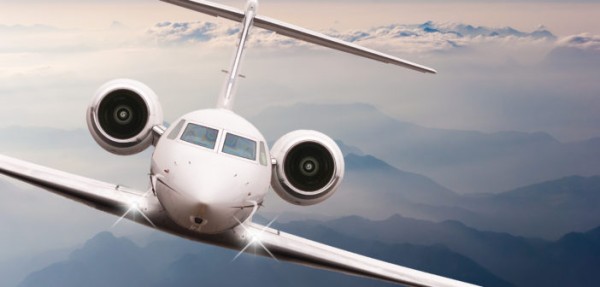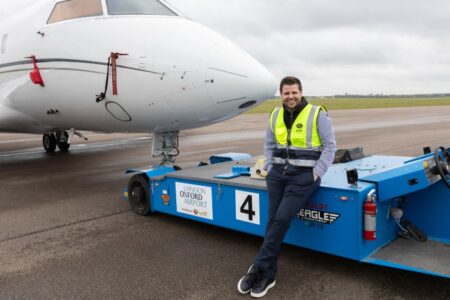To celebrate International Women’s Day 2024, BAI talks to a number of different women in the industry about their careers so far and what advice they would give to the next generation.
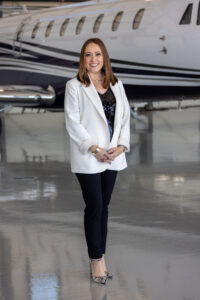 Jamie Santiago Munoz, general manager, Galaxy FBO Addison
Jamie Santiago Munoz, general manager, Galaxy FBO Addison
How and why did you get into business aviation as a career?
I stumbled into the industry while I was in college, by working an entry-level position at an FBO, and it did not take long before I was hooked. The energy, the people and the atmosphere all drew me in. Nearly 17 years later, I had held six different positions within that same organization, the last being part of the C-suite, before leaving to work for a Fortune 100 company in the aviation technology space and then later, accepting the role of general manager of Galaxy FBO, Addison where I currently am.
Do you think the sector is doing enough to encourage women into the sector?
I think we have made great strides in this effort but still have a way to go. Not only to encourage young women that they can have a meaningful career in aviation but also in building the confidence in the existing workforce to feel that they belong, and their voice deserves to be heard, regardless of the demographics of their environment. I am fortunate enough to work with other women like Melissa Shollenbarger and Lisa Peterson, who are also passionate about building up the next generation of female aviators but we need more crusaders.
What do you think would encourage more women into business aviation?
Consistency in the messaging about the many opportunities in business aviation and that it is not limited to being a cabin attendant, which was the image portrayed for a long time. I am fortunate enough to co-chair NBAA’s Young Professional council which gives visibility into what the future of business aviation can be, with female and minority representation across numerous areas. I also know that several women are very hesitant to join the industry because it conflicts with their desire to also start a family, due to the lack of efficient paid family leave benefits amongst many companies, more so in the U.S. than many other more progressive countries.
Do you think there is equal pay and treatment for women in the sector?
There are a lot of companies that have recognized the value of women in business aviation, and they are fairly compensated with both pay and benefits, but there are still many times where women must fight for equality or may not even realize that there is such a gap. I have one mentee who we discussed a salary number she should ask for from an employer and she was so hesitant for fear that they would say no. My advice to her and any other female facing the same situation is ‘force them to tell you no’. If you know your worth and the value you bring to the table, a good employer will recognize that.
What has been the proudest achievement in your career so far?
Being trusted to lead Galaxy FBO, Addison, has been the most exceptional moment in my career. I am passionate about leadership and helping people achieve their career goals so having the opportunity to select an amazing group and put my passion into action with a new team and operation has been more challenging and rewarding than I ever could have imagined. Every day I get the honor of working with the future of business aviation, and I try to never take that responsibility for granted.
What advice would you give to women interested in a career in business aviation?
There is a seat for you at the table – and you can absolutely lead from that seat if you believe in yourself and have the discipline to continue to learn from your mistakes, challenge yourself, and always find a way to pay it forward to young women you meet along the way.
How important are mentors for women starting a career in business aviation?
Having mentors has been instrumental in my life and career. My mom and my sister both taught me to be bold. As a young adult, Brian Hoffman changed the trajectory of my business aviation journey and helped me see the possibilities for my future through coaching, transparency, and brutal honesty. Robert “Bob” Wright and Mike Wright were strong mentors who taught me the importance of treating your employees like family. I also have Mentees like Lisa Peterson, Cat Wren, Gaby Gonzalez, and Imana Carrazco who constantly teach me more than I think I’ve taught them, which is rewarding in and of itself.
My personal philosophy on mentorship is simple. Be the person for others that you wish you had when you entered into your career and help challenge them to be great while always knowing they have you in their corner.
Sandra María Ólafsdóttir, Iceland Jet Center
How and why did you get into business aviation as a career?
My upbringing and early exposure to aviation deeply influenced my journey into business aviation as a career. Growing up next to an international airport, with my mom and sisters employed by Icelandair, aviation became a part of my life from an early age.
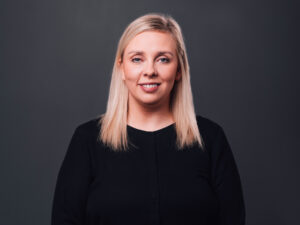
Do you think the sector is doing enough to encourage women into the sector?
I believe that there has been a shift in the last few years. It is encouraging and inspiring to see an increasing number of women in leadership roles in both business and commercial aviation. There is always room for further improvement, and we, as women in this sector, should all do our part to reduce the gender gap.
What do you think would encourage more women into business aviation?
For women to see other women in the sector, having a visible role model is crucial for us. Aviation-related organizations should work with schools to introduce the sector and its opportunities, especially for business aviation. I believe it is important to address the perception of the business aviation industry as traditionally perceived as heavily male-dominated. Steps must be taken to present the various opportunities accessible to women within this sector. The industry’s perception may be changed to make it seem more appealing to women by presenting talented women in the workforce, supporting gender-inclusive marketing initiatives, and eliminating misconceptions. Improving pay and conditions is crucial for attracting and retaining women’s talent in business aviation. Ensuring equal pay for equal work and implementing policies supporting work-life balance, such as flexible scheduling and parental leave, are essential.
Do you think there is equal pay and treatment for women in the sector?
Despite progress, there is still inequality in the sector, in some roles more than others. I live and work in Iceland, and the country is at the forefront of equality; however, I personally have faced challenges related to unequal treatment and opportunities for advancement in my career. Speaking with higher management on gender-related inequality is comparatively straightforward in Iceland since the subject is currently very relevant, and in October last year, we had a national women’s strike or “Kvennadagurinn” here in Iceland. Thousands of women across Iceland, including our prime minister, went on strike as part of a campaign pushing for greater gender equality in the country.
What has been the proudest achievement in your career so far?
My proudest achievement in my career thus far has been the courage to step into a new field and immerse myself fully in the world of business aviation. Transitioning into this sector marked a significant milestone for me, representing a professional pivot and a personal commitment to continuous growth and learning. From understanding the complexities of the business to handling the subtleties of my work, I have shown my resilience and desire to push myself outside of my comfort zone. I understand the importance of recognizing and appreciating the journey from the start and that every experience has helped shape my path and contribute to my progress, no matter how small. My biggest accomplishment is not a single milestone but rather an ongoing path of self-discovery, development, and perseverance that has taken me to where I am now in business aviation.
What advice would you give to women interested in a career in business aviation?
Do not allow anything or anybody to discourage you on your journey and be confident. Never be afraid to network with other women in the sector for support and valuable insights. Sharing experiences and learning from each other can help you navigate challenges more easily.
How important are mentors for women starting a career in business aviation?
Mentorship plays a pivotal role in advancing women pursuing an aviation career. Through mentorship, women gain invaluable opportunities to expand their professional networks, collaborations, and partnerships. Moreover, having someone experienced believe in your abilities and support your growth is empowering. I have been truly fortunate to encounter women whose mentorship has been instrumental in my journey and achievements in this dynamic industry and my MBA studies, as most of my professors were women.
Jodie Kaluza, Million Air
How and why did you get into business aviation as a career?
My grandfather was a test pilot in the United Sates Air Force and had the privilege to be stationed all over the world including Germany and Japan. He had retired as a Major before I was born, but I have very fond memories of the homebuilt aircraft he had in the garage when he passed away. Ten years after his passing, I had the opportunity to work at a small, local municipal airport as a customer service representative. Little did I know that this job would soon alter my career path. I decided to go back to school for Aviation Business Management and Airport Management and grew with that facility for sixteen years.
That facility is now one of the most successful, city-owned, and operated airport/FBOs combination in the United States. I then had the opportunity to become the airport manager/FBO manager for another private, general aviation airport outside of Austin, Texas where I spent 8.5 years before joining the Million Air in 2021.
Do you think the sector is doing enough to encourage women into the sector?
Absolutely. Business Aviation has evolved and no longer viewed as a male dominated industry as it was when I started in 1995. Personally, I have had many opportunities to speak at career days for high school students as well as help mentor college students in my current role. Kudos to groups like NBAA, Women in Aviation and Women in Corporate Aviation. They are doing a fantastic job getting the word out about our segment.
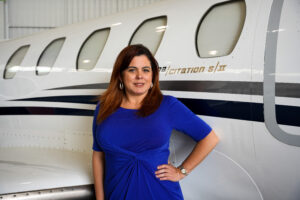
What do you think would encourage more women into business aviation?
Awareness. Business aviation is a very small segment of the much larger aviation community. Many students I have mentored in the past already knew about commercial and military opportunities, but they have limited information about business aviation.
Do you think there is equal pay and treatment for women in the sector?
Yes, I do. I feel business aviation has already been very merit based. I came in at an entry level position and worked my way up to management position. Personally, my biggest challenge was learning how to be adaptable as I transitioned from a municipal employee to the private sector.
What has been the proudest achievement in your career so far?
That is a tough question. I have so any major milestones in my career that I am extremely proud of, but the most recent was joining the most well-respected FBO brand, Million Air.
I have spent years trying to emulate Million Air’s success in my two previous but getting to join the team of such a well-respected and powerful brand has been amazing. The opportunity to support multiple FBOs within the network has been an extreme honor.
What advice would you give to women interested in a career in business aviation?
Network with others within our industry and find a mentor. I highly recommend joining local regional groups to get to know people in your area. They often have student memberships for those not yet in the industry. They have access to scholarship opportunities, continuing education and offer access to mentors.
How important are mentors for women starting a career in business aviation? Who was your mentor?
Very! My mentor was a gentleman named Gene Condreras. He was with Panorama Flight Service out of Westchester County (HPN) in New York. I could pick up the phone any time or day and he would be there ready to assist me. I had met him at a Texaco FBO dealer meeting in 2005 and we became instant friends. Over the next ten years, I spent many nights talking to him trying to understand the nuances of business aviation and how non-municipalities operate and grow.
Right after accepting my airport manager position in December 2012, I was flooded with self-doubt. I thought I was accepting an FBO manager position, but the owner called and explained I would serve as both his airport manager and the FBO manager. I wasn’t sure I was ready, so I immediately called Gene in a panic. I remember he stopped me mid-ramble and said, “You got this kiddo… I know you can do this and so much more. I knew it the moment I met you.” I knew I still had a ton to learn, but at that moment, I knew I had an amazing mentor supporting me as I grew professionally.
Charlotte Rees, first officer on the BE20, ground operations manager and owner, Fly Wales
How and why did you get into business aviation as a career?
My route into aviation wasn’t your typical one. Fly Wales is a family run business, that began with my grandfather and grandmother starting a flying school back in 1976. We are actually dairy farmers and the airport at Haverfordwest is attached to our farm!
We progressed from the flying school to Chieftain, Navajo and then Senecas and then onto our Kinagirs.
Whilst studying for my Pharmacy degree in Bath, my uncle who was running the flying side of things, sadly died so my dad took over the flying, whilst still farming, with the help of our chief pilot Gwyndaf who has been with us since he was 18 (he is now mid 50s!)
I came home in the holidays and helped in the flying school office and decided to have a go at flying.
The flying bug hit me hard and I decided that I would take a year out of university to learn to fly and go from there. That year out turned into several years, I got my fATPL and never went back to university. It was the best decision I have ever made.
From there we progressed to two Kingairs and a C525 with the farm still a massive part of the flying.
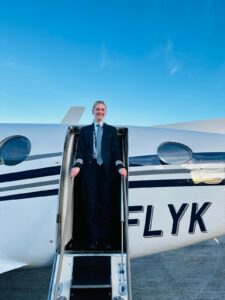
Do you think the sector is doing enough to encourage women into the sector?
I think at the moment there is a huge drive for woman in aviation but not as much into the business aviation side of things.
What do you think would encourage more women into business aviation?
At flight school, instead of just airlines coming into the school and giving talks, I think there should be more interaction with the business aviation side which associations such as the Air Charter Association. To show woman that there are more routes in aviation, not just airlines.
What has been the proudest achievement in your career so far?
I won the Young Person of the Year at the Air Charter Association Awards in 2022.
What advice would you give to women interested in a career in business aviation?
Just go for it! Don’t be put off by the image of business aviation being male dominated. Unfortunately, it is fact, however 99% of the people you meet in the business aviation are very helpful and friendly. It’s like one dysfunctional international family.
How important are mentors for women starting a career in business aviation?
It’s important to surround yourself with the right people who will guide you throughout your career. In business aviation everyone knows everyone so you will never be short of receiving advice – make sure to listen to them as it can change your whole career!
Suzi Uhls, general manager, Million Air Indianapolis
How and why did you get into business aviation as a career?
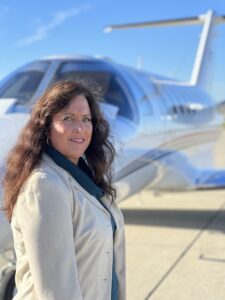
My career in aviation began 20 years ago during my 10 year career as a hospitality manager focused on restaurant and lounge operations. I was recruited by the FBO during my 8 year tenure as a fine dining restaurant manager at a local hotel. The managers of the FBO just asked me after years of seeing me during lunches why I didn’t work for them. I was naturally intrigued and pursued their offer, never dreaming that I would be where I am today. I started as a customer service manager with absolutely no corporate aviation or experience. Now, I can’t imagine it not being part of my life.
Do you think the sector is doing enough to encourage women into the sector?
I think that corporate aviation is leading the way in supporting women and the equality in top fields. What was once a men’s club is proving to be more inclusive but is still a hidden gem. I think women leading corporate aviation facilities bring a comfort level to women in other industries as they travel in business aircraft, often piloted by women. Million Air is leading this trend with several general managers being strong role models. I’m excited to be a part of this wave.
While working in a male dominated profession has proved challenging, the rewards are innumerable. The challenges are more often related to the physical aspect of operations and the perception from crews than the actual relationship between operations and management. I’ve found that if you are willing to learn and try to walk in someone else’s shoes, the respect and loyalty naturally progress. I’ve personally spent many hours in a de-icing truck during Midwest winter storms.
I have also been witness to a gentle upswing of equal and fair compensation in this industry. Corporate aviation sees the top women in most fields and we are hiring more consistently. The role models in this industry and for women in all fields are present in my life on a daily basis. I encourage everyone to seek a mentor. I had the pleasure of having a general manager for 20 years that was one of the first women in upper management in the corporate aviation industry. With over 40 years of FBO experience and the ability to competently complete any role in this operation, my goals were set high. Our FBO is multi faceted and her guidance was the most beneficial to me seating in her chair when she retired.
What advice would you give to women interested in a career in business aviation?
I advise women to look for the opportunities in corporate aviation. Choose a mentor who can guide you in the direction of your strengths. Take the risk to a new career and stay true to your goals, encouraging others to see your strengths even if you are entering an entirely new field.
Cynthia C. E. de Oliveira, operation director, Lider Aviação
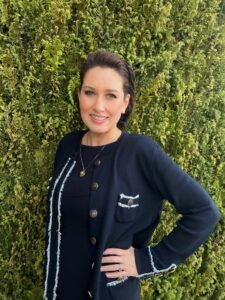
How and why did you get into business aviation as a career?
I graduated in Business with emphasis in foreign trade. In aviation foreign trade has a huge importance! Especially when the manufactures are not in the same country as the aviation company. So I applied to an internship opportunity in this company, which was – and still is – the biggest in Latin America with an enoumous logistic area – Lider Aviação. As the company had its own fleet of airplanes and helicopters, multibrand MRO, I saw a great opportunity in this area. At the beginning I was part of the team responsible for parts, components and engine import and export process, including the whole process of an aircraft purchase and importation.
Do you think the sector is doing enough to encourage women into the sector?
Absolutely. I joined the company 30 yeas ago, and I do remember there being a lack of women involved in this sector. Over the years, I’ve noticed more and more women joining business aviation. I still believe there is space for more women in our business, and I wish to see more women working as pilots, mechanics, technicians, operations and occupying leaders positions! 17% of our staff at Lider Aviação are women, much more than in the past, and still increasing!
What has been the proudest achievement in your career so far?
If I have to pick one it would our achievements during 2014 World Cup. We handled 70% of the business aviation movement in Brazil, as the only company with presence in all of the host cities – and they were many – 12! We handled 82% of the traffic on finals in SBGL – Rio de Janeiro International Airport. It was extreme, intense and challenging. My team worked hard to navigate the restrictions we faced and to manage the amount of airplanes with a limited infrastructure. At the finals we worked 36 hours without resting to handle and release all the airplanes. Team work, resilience, professionalism, commitment, strength – all of these made us deal with the challenges of this unique operation and its greatness.
What advice would you give to women interested in a career in business aviation?
Business Aviation is fascinating. A complete different world, where precision is absolutely relevant, commitment a must, responsibility a key word, and each successful mission brings extreme satisfaction. There are many opportunities for all types of styles – if you are very organized and like to control details, you could fit perfectly in a flight planning department. If you love flying, you can be a pilot. If you interest is in the mechanics, you can be a technician! If you like adrenaline, be part of operations. Love serving people? Flight attendants, ground agents, front line people. Enjoy procedures? Be part of the safety chain! You have all these options! Want to run a business? You can do it! Wherever you like to do, if there is aviation fuel in your blood, just start doing the best you can, with the resources you have, to give your best! Just pick to be part of this amazing universe!
As in any industry, no matter how simple your task is, do it in the best way you can! Make a little bit more than requested. And do it with your heart!
How important are mentors for women starting a career in business aviation? Who was your mentor?
I had the privilege to always have great managers, who gave me space to share and implement my ideas. My main mentor became the CEO of our company in 2024, Junia Hermont. So we proudly have an women leading our company. Besides her, we have other key leading positions occupied by women here at Lider. 40% of our leadership are women! And I am so proud and happy to be part of it.
Lisa Holland, Sheltair
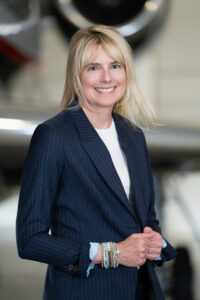
How and why did you get into business aviation as a career?
It was a family business started by my dad, Jerry Holland, that I later got into.
Do you think the sector is doing enough to encourage women into the sector?
I think groups like the 99s, Women in Aviation International, Sisters of the Skies, and many others along with events like Girls in Aviation Day do an amazing job in encouraging women and young girls to peruse their careers in aviation.
What do you think would encourage more women into business aviation?
Having access to more information and exposure to the different aspects of aviation. It’s important to convey that there are a variety of fields of study when it comes to this industry, and it’s not restricted to just flying. There’s accounting, marketing, human resources, medical, business, design, and so forth. The possibilities are endless.
What has been the proudest achievement in your career so far?
Four years ago, we partnered with our local Women in Aviation International (WAI) chapter to host Girls in Aviation Day (GIAD) at our Tampa FBO location. Since then, we’ve grown to partner with multiple WAI chapters across our FBO network to bring GIAD to a wider audience, increasing attendance year after year. Helping bridge the gap between aviation and the next generation has been my proudest achievement so far in my career.
What advice would you give to women interested in a career in business aviation?
Chase after what you want, don’t wait for it to fall onto your lap. There are so many opportunities to attend aviation events, or network online, where you can ask questions and find many willing mentors. Find your platform where you feel your voice will make the most impact.
How important are mentors for women starting a career in business aviation? Who was your mentor?
As a male dominated industry, I wasn’t so fortunate to find female mentors early in my career in aviation. I believe if we want to see change, we need women to continue empowering other women, and men to continue to advocate for women in business aviation. I count myself fortunate that Todd Anderson was my mentor advocating for me. Since then, I’ve built a network of women in aviation I’m proud to say we’ve helped each other soar.


